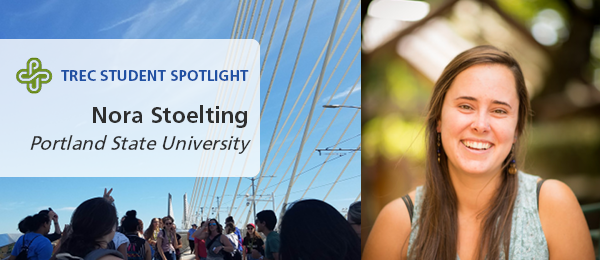TREC Student Spotlight: Nora Stoelting, Portland State University

Nora Stoelting is pursuing a dual master's degree in Leadership for Sustainability Education and Urban and Regional Planning at Portland State University. She is excited about the ways these two programs intersect in building a more dynamic, connected, and sustainable world. Nora's background is in garden education and environmental advocacy, and she most recently worked in waste minimization with airport businesses at PDX. Nora is thrilled to join TREC to work on education programming through integrating tactical urbanism projects into PSU classes via Better Block PSU and designing TREC's free summer camp for high school students. She believes strongly in the power of collaborative, holistic, experiential teaching and learning to transform ourselves and the world.
Tell us about yourself?
I am a cis, female, white, 27 year old graduate student living in NE Portland. I am currently pursuing a double masters in Leadership for Sustainability Education and Urban and Regional Planning. I am passionate about such a wide, interconnected array of topics that it was impossible to pick one program! Lately I have been really interested in envisioning a libertory future (within myself and the world). I have been feeling really inspired by Black female activists including adrienne marie brown, Mariame Kaba, bell hooks, and angel Kyodo williams. I am interested in how our workplaces and classrooms can be microcosms for creating the kind of change we hope to see in the world. In addition to dreaming up a better future, I really enjoy running trail races, playing with my new puppy, experimenting with sourdough, and spending time in the forest.
What (or who) has influenced your career path in transportation?
I never explicitly realized I was interested in transportation until soon before joining TREC, but looking back on my life it makes a lot of sense! I grew up in Brooklyn and relied on the NYC subway to get nearly everywhere. Public transit was so much a part of my life that I think I took it for granted, and never quite realized all that goes into it until starting grad school. I have been super inspired by many of my peers who are dedicated to the transportation sector and have lots of innovative ideas around transportation justice. Since public transit is a little less widespread here compared to NYC, I made the switch to biking when I moved to Portland 6 years ago. I feel like Portland has such a big biking presence that it is hard to not be influenced by it, and traveling by bike is so rewarding mentally and physically. Having extensive public transit and biking experience in two very different cities has definitely influenced my path in transportation.
Over the last six months you've been part of the TREC team as an Education Assistant GA, supporting the development and coordination of our two transportation summer camps for Oregon high schoolers. Tell us about that experience and how you were able to pivot to a virtual format?
It has been such a rewarding project for me, because I get to build upon my skills in curriculum design and facilitation in entirely new ways. As someone who is very new to transportation, I get to learn alongside the students which adds a level of humility to my role as a leader! I was particularly excited about utilizing some holistic teaching and learning tools that I have explored in my Leadership for Sustainability Education courses, and training our guest speakers to implement many of these tools. Since switching to a virtual format, all of that has looked different. I am passionate about teaching and learning that is relational, reflective, and deep. When we decided to switch the camps to virtual, it was an interesting challenge for me to see how engaging I could make the camp virtually. I felt it was even more important to have intentional structure to the camp sessions since the virtual format was new for us all. It has also been so important to be flexible, self-compassionate, and curious in navigating this for the first time. Overall, the camp has been going really well. The students have been able to form relationships with each other, their Peer Mentors, and the guest presenters in much deeper ways than I anticipated. We have integrated weekly contests, opening and closing circles, small group work, and experiential learning field activities which gives students a nice variety of ways of engaging with each other and the material. I dismissed virtual learning at first as being unconducive with relationship building, and I am finding that to be untrue!
After graduation, what future work do you envision doing in transportation?
I am not certain how my transportation path will evolve, and I am open to it all! I would definitely be interested in continuing to do work that blends my two masters programs- integrating meaningful education opportunities into urban planning work. I am making a lot of great connections through working on this camp and hosting various transportation professionals and I believe those connections will be useful in the future as well.
The Transportation Research and Education Center (TREC) at Portland State University is home to the National Institute for Transportation and Communities (NITC), the Initiative for Bicycle and Pedestrian Innovation (IBPI), and other transportation programs. TREC produces research and tools for transportation decision makers, develops K-12 curriculum to expand the diversity and capacity of the workforce, and engages students and professionals through education.
